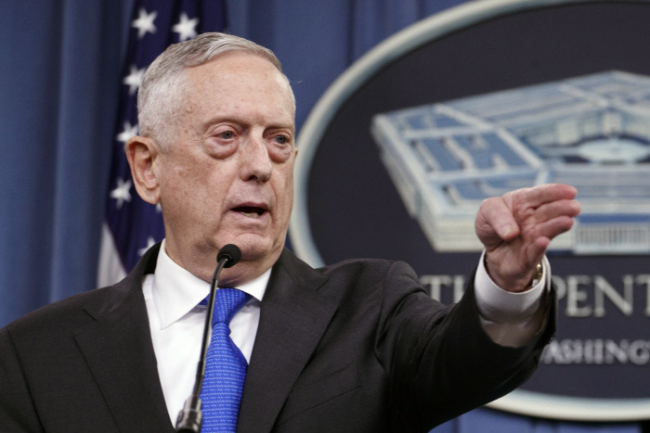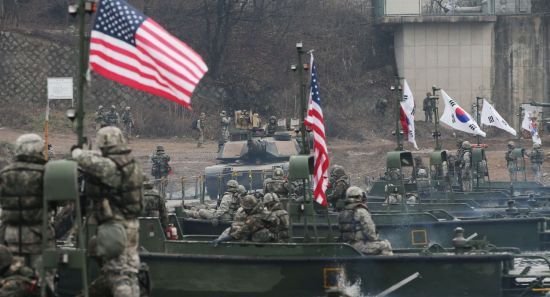The United States' consideration of reducing the size of a major combined exercise with South Korea next year signaled its desire for continued diplomacy with North Korea, but deepened fears over a possible weakening of the allies' defense posture.
On Wednesday, US Defense Secretary James Mattis told reporters that the springtime Foal Eagle exercise will be "reduced in scope" and that it is being "reorganized a bit" to keep it at a level that will not be harmful to diplomacy with Pyongyang over its denuclearization.
 |
US Defense Secretary James Mattis (Yonhap) |
The allies' defense authorities have been holding consultations over their plans for major regular exercises as part of efforts to facilitate dialogue with the communist state. They earlier said that they would make a decision on the plans before Dec. 1.
"South Korea and the US are still carrying out a review vis-a-vis next year's combined exercises. We understand that Secretary Mattis made the remarks (on the Foal Eagle exercise) in line with the allies' consultations," Choi Hyun-soo, Seoul's defense ministry spokeswoman, told reporters.
"We will tell you details when a concrete decision is made on that matter," she added, refusing to further elaborate.
Mattis' comments on the field exercise were taken as signaling Washington's willingness to continue its diplomatic drive to induce North Korea's nuclear disarmament, particularly ahead of a possible second summit between US President Donald Trump and North Korean leader Kim Jong-un next year.
Concerns have recently mounted that the US' denuclearization drive could lose traction amid an apparent lack of progress in its negotiations with Pyongyang and after the Nov. 6 US mid-term elections, a key political event for which Trump needed fodder to play to his support base.
"Secretary of State Mike Pompeo has repeatedly mentioned progress in talks with the North amid talk of a possible second summit between the US and the North. Having said that, an announcement on the plan to conduct the Foal Eagle as planned could derail engagement efforts," Park Won-gon, a diplomacy professor at Handong Global University, said.
"At a time of dialogue, the US may well take options, such as calling off or scaling back major combined exercises with the South," he added.
This year alone, the allies suspended major exercises, including the summertime Ulchi Freedom Guardian and most recently the Vigilant Ace air exercise, all of which they have called "defensive in nature."
 |
(Yonhap) |
Along with the UFG and Key Resolve, the Foal Eagle is among the allies' large-scale annual exercises. The Foal Eagle in April mobilized some 300,000 South Korean troops and 11,500 from the US.
The allies' military authorities appear to seek a reorganization of major exercises, which used to involve the deployment of US nuclear-capable bombers, aircraft carrier and other strategic weapons, while keeping smaller-scale drills and exercises intact.
After the annual Security Consultative Meeting with Mattis in Washington last month, Defense Minister Jeong Kyeong-doo said that the allies will make a decision on plans for next year's major exercises before Dec. 1 after producing results of a joint working-level review by Nov. 15.
Seoul officials said that consultations are still underway over the exercise plans.
"We plan to hold our part of the exercises as planned, but no decision has been made yet on the US forces' participation during allied drills," a government source in Seoul said on condition of anonymity.
"There will be an exercise-related meeting (between Seoul and Washington) in December and we anticipate that an overall direction of the allies' exercises will be mapped out there," the source added.
Some military officials believe that even if major exercises are suspended or scaled back, the allies can still maintain readiness as they can employ high-tech solutions apart from each other, such as computerized programs and long-range military equipment, to produce the same results as normal exercises in which they are jointed together.
Yet worries persisted that any additional decisions to reduce exercises in scope or size could be detrimental to their combined defense posture.
"Should the allies postpone drills one time, twice and more, this will affect the readiness of course," Nam Chang-hee, a security expert at Inha University, said.
"But there are ways to flexibly modulate the intensity of the exercises to maintain readiness, satisfy Trump's desire to reduce costs for combined drills and at the same time revive the momentum for dialogue between the US and North Korea," he added.
Military experts are mostly concerned about a possible loss of US troops' opportunities to familiarize themselves with the operational environment on the Korean Peninsula so that they can operate immediately in case of a contingency.
"A key element of Washington's extended deterrence to South Korea is the augmented troops and the deployment of strategic weapons in case of a crisis here. This could be affected by the suspension of the combined drills," Park said.
The extended deterrence refers to the US commitment to use a full range of military capabilities, including nuclear, conventional and missile defense assets. (Yonhap)





![[Herald Interview] 'Trump will use tariffs as first line of defense for American manufacturing'](http://res.heraldm.com/phpwas/restmb_idxmake.php?idx=644&simg=/content/image/2024/11/26/20241126050017_0.jpg)


![[Health and care] Getting cancer young: Why cancer isn’t just an older person’s battle](http://res.heraldm.com/phpwas/restmb_idxmake.php?idx=644&simg=/content/image/2024/11/26/20241126050043_0.jpg)
